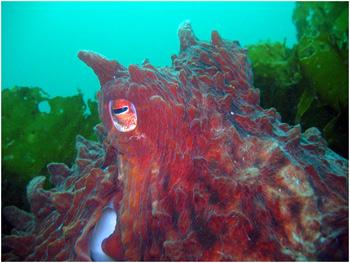
To hunt or to eat the octopus, that is the question. A recent article looks at Seattle's paradox when it comes to giant Pacific octopus.
Janna Nichols, Courtesy of Washington Fish and Wildlife
There's an interesting feature in the New York Times Magazine this week looking at the controversy surrounding octopus hunting in Puget Sound. (HT Sightline Daily.) The Times finds a lot of fodder in the Northwest (like a video looking at Portland's 'hipster chic' bike fashions and their story on the opening of the super green Bullitt Center) and it's always interesting to see how our region is portrayed beyond our border.
The article -- which made me laugh out loud several times, including a well-placed 'Parks and Recreations' reference -- explicitly recalls the now infamous hunting of a giant Pacific octopus at a popular dive spot in Puget Sound.
An adventurous 19-year old named Dylan Mayer trained for the dive and the hunt. When he encountered the cephalopod as big as him, he fought it mano a mano for 25 minutes. (While you were legally allowed to hunt the creature, you couldn’t shoot it or pierce it in any way.) As he came out of the water with his kill, there were other divers there -- none too impressed -- who snapped photos and thus began public outcry and a call for protection of the giant Pacific octopus, a.k.a. 'G.P.O.'
This scene is juxtaposed with a scene across town at a new foodie hotspot, Bar Sajor. Chef/owner Matthew Dillon is known for a fresh locavore aesthetic and this new restaurant has already gotten rave reviews. That very night Bar Sajor was serving -- you guessed it -- fresh giant Pacific octopus.
“So as the "Save the G.P.O." campaign raged this spring, the city raved about Dillon's octopus salad.”
In response to public interest in the matter, Washington Fish and Wildlife went through the formal process of getting an advisory group together, holding public meetings, doing research, making recommendations. (Remember previously mentioned 'Parks and Recreation' reference?) The fact is, the octopus is doing quite well in Puget Sound, thank you very much. But the state went ahead and instituted a ban on hunting of the charismatic G.P.O. in certain Puget Sound dive spots.
There’s lots more in the New York Times piece, which you should read there. But I thought I’d share some of the more thought-provoking comments on the article, beyond the expected reactions about the ethics, legality of hunting the Great Pacific Octopus and whether or not they should be protected, etc.
doug mclaren writes:
“The paradox of sustaining local natural resources is that in many cases, you have to eat it to save it. For the disparate parts of our society to agree on the value of protecting places like the Puget Sound from industrialization, pollution, over use, etc., it has to be available for recreational and commercial hunting, fishing, etc. Much of the preserved wetlands across the middle of America were created to sustain the hunting of wild ducks during their migrations. Otherwise many more species would have gone extinct. One of the strongest communities in support of water quality are the commercial oyster growers.”
Photograph showing divers with the
largest catch of the 1963 World
Octopus Wrestling Championships
Originally published in: Skin Diver
Magazine July 1963.
The relationship between conservation for the sake of food sources is the basis of a lot of environmental fights. Investigate West recently reported on a lawsuit that says Washington state is underestimating the amount of fish people are consuming, allowing more permitted industrial water pollution. Here at EarthFix, we've talked to some of those oyster growers who are concerned about ocean acidification, a big threat to Washington's shellfish industry, worth $270 million a year.
Dan M notes:
“Seattle used to be the home of many proud Octopus Wrestlers. This area held the World Octopus Wrestling Championship in the 60s. This was a real thing. Seattle has become a city of transplants, and the connection to its fishing, hunting, farming, and logging roots was lost long ago.”
Yes, octopus wrestling in Puget Sound was a real thing.
If you want to see for yourself why people go gaga over the giant Pacific octopus, check out Hatfield Marine Science Center's 'OctoCam,' capturing the movements of the octopuses they keep for short periods of time.
-- Toni Tabora-Roberts
